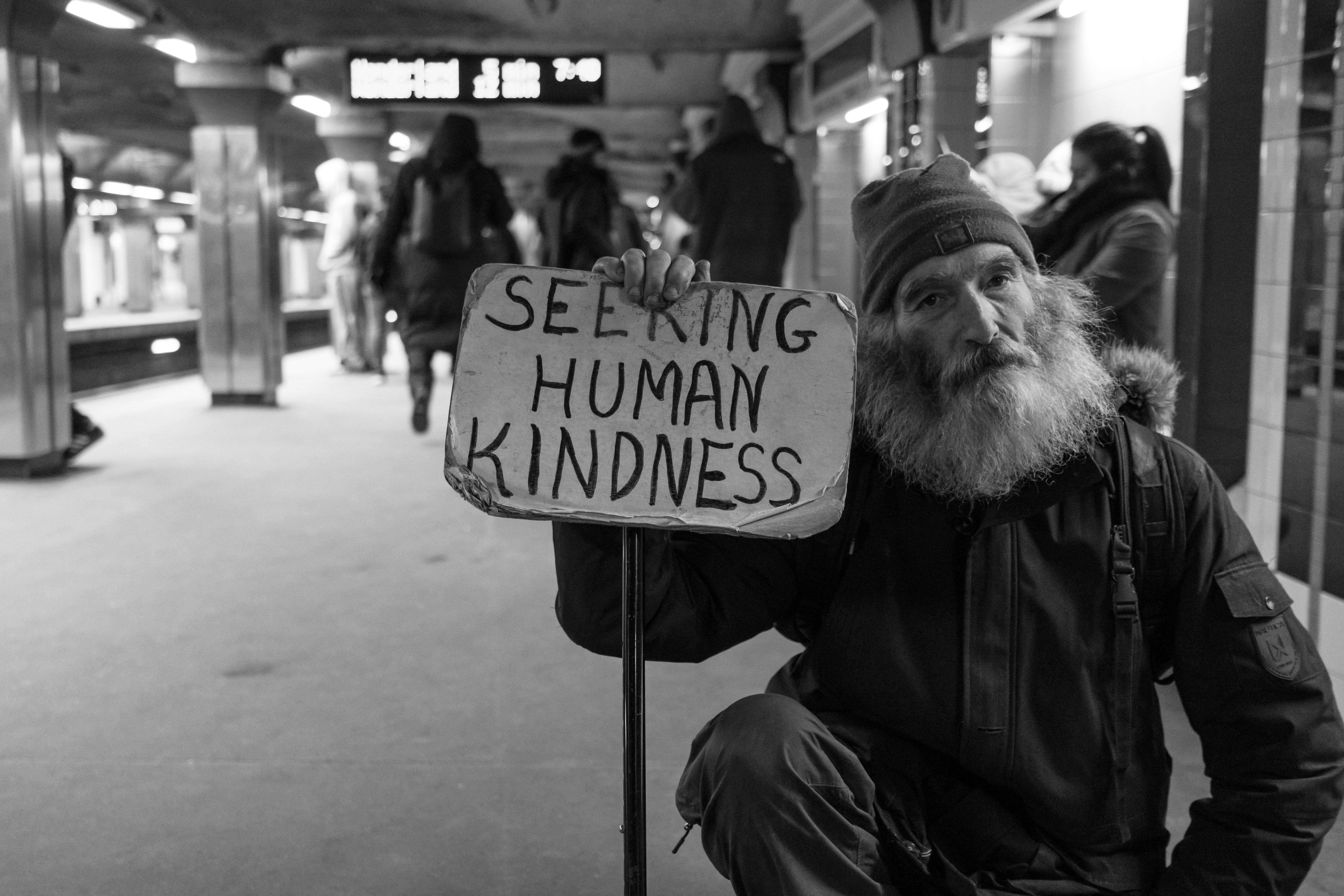“Kindness is the language which the deaf can hear and the blind can see.” Mark Twain
Today is the 20th World Kindness Day with events planned all over the globe.
Kindness is perhaps the defining quality or essence of being human. It’s what we look for in the people we love and at the heart of our lifelong friendships. And it might just be the most powerful catalyst for positive change in our working lives.
Only last week, while walking back towards London’s Charing Cross train station, I watched a young family approach a homeless woman on the street to give her the extra meal deal they had thoughtfully bought from a nearby supermarket. Two young children learning the valuable lesson that someone in a less fortunate position is still worth their time and kindness. While the young woman received both a much-needed meal and timely reminder that not everyone in society is totally indifferent to her current plight.
Similar stories of selfless acts of kindness now appear on social media every day. Like the students from Bristol University who raised £1500 to help their favourite cleaner go home to visit his family in Jamaica (https://www.bbc.co.uk/news/uk-england-bristol-45573247). Celebrities ranging from Taylor Swift to Stormzy to Dwayne Johnston (AKA “The Rock”) are in on the act sharing their good fortune with people who needed a leg up. While award winning war zone BBC journalist Lyse Doucet recently acknowledged the part that kindness plays in her ability to uncover the news: https://twitter.com/SussexUni/status/1022872994912321537/video/1.
And now we see large companies identifying acts of kindness as high-profile elements of their marketing strategies. Whether its Unilever’s “Heroes” programme or Mars’ “Random acts of chocolate” campaign, being kind is mainstream as never before. It appears that being kind brings greater rewards other than the anticipated warm glow.
But have you ever considered what part kindness plays in the workplace on a day to day basis?
We all have a story to tell about the kind generosity showed to us by a former boss or colleague when starting a new job or helping us out of a tricky situation. But bizarrely, in many workplaces showing kindness can still be viewed as a sign of weakness. But given a choice would any of us honestly ever really want to work somewhere like that?
At a time when the world of work is waking up to the consequences of a mental health crisis that has crashed over our society with the elements of surprise and cruel ferocity of a tsunami, we must ask what part kindness plays in how we work and ultimately our wellbeing.
We hear a lot of talk about the importance of being happy and healthy at work but how do we get there? Happiness can be a little difficult to define as the feeling means different things to all of us. I would be delighted to see my football team’s rivals relegated but even through my partisan tinted glasses I can see that wouldn’t bring the same level of delight to their already delusional supporters.
However, kindness is less subjective and actively self-fulfilling. It’s tough to measure kindness but what we can do is enthusiastically choose to look for opportunities to shower anyone we stumble across with acts of kindness. Even those rival football supporters. Let’s face it they need all the help they can get. 
But active kindness at work leads to many business advantages:
Great People:
It’s easier to attract and keep great people if we are the type of workplace where people look out for each other. Most of us can pick that up the moment we walk in for our first interview. Is the security guard friendly or does the interviewer offer you a drink?
A kind workplace means we feel secure enough to do our best and to suggest something new or even inspiring rather than keeping your head down for fear of failure and the anticipated subsequent rollicking.
Kind workplaces therefore ultimately become more successful ones by keeping the talented and motivated individuals they were lucky to attract in the first place.
The Right Reputation:
We all know companies that are inherently nice to work with and others that quite frankly come under the “rotters” category. Those that take the time to establish fair minded working relationships while others seem keen to get back to kicking the company dog once they’ve dealt with you.
I was fortunate to work for a ridiculously talented and kind man called (Sir) Tony Jay who included amongst his many achievements writing the iconic BBC comedy Yes Prime Minister. He was kind to all his colleagues sharing his wisdom with us whenever it was needed. But at a heart-warming company reunion he modestly put some of his success down to recruiting kind people who then recruited other kind people. It makes you wonder if that is the secret to how all the great companies establish not only their success but their reputation for being good people to work with. 
So, given an equal choice, which organisation do customers or suppliers choose to work with long term? The friendly one they have established a relationship with or the one they must work with despite the lack of conviviality? As author Jill Lubin (The Profit of Kindness: How to Influence Others, Establish Trust, and Build Lasting Business Relationships) says “By practicing kindness in your business, you can increase your income, generate new clients, stimulate repeat customers to buy, and much more.”
Wellbeing:
It’s no surprise to discover that ultimately people will be happier and healthier in a kinder workplace.
And yet traditionally the way we look after employees’ wellbeing has been dictated by rules and regulations established to provide the minimum acceptable levels of health and safety at work.
The smarter an organisation is, the further it goes to look after its most valuable asset, people. And the greater emphasis and investment that goes into their wellbeing the more likely that those people will repay the faith and kindness to them several times over. 
In fact, research from Harvard and UCLA in America revealed that on average each kind act is repeated 9 times. So, you see, kindness is infectious to the point where employees will actively be looking for opportunities to reciprocate the kindness they have experienced towards their colleagues, customers, friends and family. The flip side is that unkind acts are repeated at the same ratio. So, the alternative to kindness rapidly escalates towards a negative work experience. It’s a no brainer really.
Creating a kinder workplace through health and safety at work:
Bah humbug I hear the “glass half empty” cynics among you crying. Triple my wages and I’ll be kinder at work. Sadly, that isn’t on the table yet.
So what is the secret? What does kindness in the workplace look like and how do you go about making sure it happens in your organisation?
To put it simply kindness at work happens by actively choosing to take regular actions that show other people that they matter and are valued. Doing the right thing and it’s much easier than you might imagine. The key is the level of active participation throughout an organisation that truly values the wellbeing of the individuals within.
And what better place to start in any organisation than with the way we do health and safety. Traditionally safety at work has been viewed as the domain of killjoys and their mildly irritating rules and regulations. But truly world class safety cultures have at their heart an inherent understanding that safety is ultimately about good people looking out for each other by taking kind actions that demonstrate they care. Going way beyond basic legal compliance.
We all have unique experience or knowledge in our job that we can share with our colleagues to keep them safe. So what if from now on we all actively look for opportunities to help each other out with regular acts of safety kindness? And when someone helps you out with an act of safety kindness make sure you look for an opportunity to pay it forward or pass it on as soon as you possibly can. Active kindness cascading across our workplace social networks influencing not only our colleagues but the companies we work with.
A simple act of kindness today could save a life tomorrow, next week, or next year. It could help a colleague talk about something that’s causing them heartache. It might even win you new customers. Either way it could well be the start of something remarkable that will change our world of work forever.
“Never doubt that a small group of thoughtful, committed, citizens can change the world. Indeed, it is the only thing that ever has.”” Margaret Mead
Pay It Forward Safety ™ is the new positive safety approach from Lattitude available to like minded people: https://www.lattitudesafety.co.uk/programmes/pay-it-forward/.
Thank You
Rob Coyle
![]()

